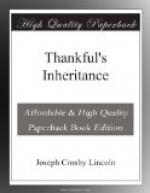Mr. Daniels was very gracious and very affable. He spoke largely of cases intrusted to his care, of responsibilities and trusts, and if the guest gained the idea that Mr. Daniels was a very capable and prosperous lawyer indeed—if he gained such an idea and did not express it, how could Heman be expected to contradict?
After dinner—Kendrick informed his friend it was one of the best he had ever eaten—he and the captain walked over to the village, where they spent the afternoon wandering about, inspecting the ex-barber-shop and discussing chances and possibilities. The young man was still doubtful of East Wellmouth’s promise of professional opportunities. He should like to live there, he said, and he might decide to do so, but as yet he had not so decided. He seemed more pessimistic than during the drive down from the station. Captain Obed, however, and oddly enough, was much more optimistic than he had been at first.
“I don’t know, John,” he said, “but I ain’t sure you couldn’t make good, and pretty good, too, by settlin’ here. This section needs a good lawyer.”
“Another good lawyer you mean. Daniels is here, remember. Judging by his remarks this noon he is very much here.”
“Um—yes, I know. If you take his remarks at the value he marks ’em with he’s the whole bank and a safe-deposit vault hove in. But I wouldn’t wonder if those remarks was subject to a discount. Anyhow I know mighty well there’s a lot of folks in this town—good substantial folks, too—who don’t like him. They hire him once in a while because there ain’t another lawyer short of Trumet and that’s quite a ways. But maybe they’d be mighty glad to shift if there was a chance right at hand. Don’t you strike the colors yet awhile. Think it over first.”
He insisted upon Kendrick’s returning to the High Cliff House that night. “I want Mrs. Barnes to show you the room she’s got vacant,” he said. “Ain’t no harm lookin’ at a brindle calf, as the feller said; you don’t have to buy the critter unless you want to.”
So Mr. Kendrick inspected the rooms and expressed himself as delighted with them.
“They’re all right in every respect, Captain,” he declared. “And the food is more than that. But the price—although it’s surprisingly low considering the value offered—is too steep for me. I’m afraid, if I should locate here, for a trial trip, I couldn’t afford to be comfortable and I shouldn’t expect to.”
Captain Bangs remained to take supper with his friend. The meal over, they and the rest of the boarders were seated in the big living-room—once Captain Abner’s “best parlor”—when there came from outside the rattle of wheels and the voice of Winnie S. shouting “Whoa!” to General Jackson.
Thankful, who had been in the kitchen superintending Imogene, who was learning rapidly, came hurrying to the front door. The group in the parlor heard her utter an exclamation, an exclamation of surprise and delight. There were other exclamations, also in a feminine voice, and the sounds of affectionate greetings. Then Mrs. Barnes, her face beaming, ushered into the living-room a young woman. And this young woman was her cousin, Emily Howes.




